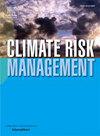Climate shocks and food insecurity: Are Burkinabè households resilient in the face of various disruptions?
IF 4.8
2区 环境科学与生态学
Q1 ENVIRONMENTAL SCIENCES
引用次数: 0
Abstract
In response to climate change and international economic crises, which exacerbate the vulnerability of populations in developing countries to various disturbances and shocks, resilience is proposed as a programmatic solution to prevent the deterioration of food security and well-being. This study aims to measure and analyze Burkina Faso households’ resilience to food insecurity during periods of climatic shock and stress. Drawing on the literature concerning the notion of resilience and its conceptualization, we assessed a resilience structure based on three pillars: absorption, adaptation, and transformation. The data used come from the Harmonized Survey of Household Living Conditions conducted in 2018 by Burkina Faso’s National Institute of Statistics and Demography, covering 7,020 households across the country. Statistical analysis, based on structural equation models, revealed that all three pillars are significant in explaining the level of household resilience, measured by a standardized index ranging from 0 to 1. Based on this scale, the average resilience index was estimated at 0.3985 at the national level and exhibited significant differences across regions and socioeconomic factors. Thus, the average resilience index is lower in rural areas compared to urban areas, and similarly, households headed by women exhibit lower resilience levels relative to those headed by men. Furthermore, the resilience capacity index and food security indicators show statistically significant negative correlations with idiosyncratic and systemic disturbances reported, suggesting that their occurrence could have negative impacts on households. One of the key findings is that strengthening the pillars positively impacts social well-being. Therefore, we recommend that development policies focus on supporting households in diversifying income sources, improving access to essential social services, developing supportive economic infrastructure, and enhancing social safety nets to increase the resilience of vulnerable households.
气候冲击和粮食不安全:面对各种干扰,布基纳法索家庭是否具有复原力?
气候变化和国际经济危机加剧了发展中国家人口面对各种干扰和冲击的脆弱性,为应对这些问题,人们提出了复原力这一方案,以防止粮食安全和福祉恶化。本研究旨在衡量和分析布基纳法索家庭在气候冲击和压力时期对粮食不安全的抵御能力。根据有关复原力概念及其概念化的文献,我们评估了基于三大支柱的复原力结构:吸收、适应和转化。所使用的数据来自布基纳法索国家统计和人口研究所于 2018 年开展的家庭生活条件统一调查,覆盖全国 7020 户家庭。基于结构方程模型的统计分析显示,三大支柱在解释家庭复原力水平方面均具有重要意义,该指数以0至1的标准化指数衡量。因此,农村地区的平均复原力指数低于城市地区,同样,女户主家庭的复原力水平也低于男户主家庭。此外,抗灾能力指数和粮食安全指标与所报告的特异性和系统性干扰在统计上呈显著负相关,表明这些干扰的发生可能对家庭产生负面影响。主要研究结果之一是,加强支柱会对社会福祉产生积极影响。因此,我们建议发展政策侧重于支持家庭实现收入来源多样化、改善基本社会服务的获取、发展支持性经济基础设施以及加强社会安全网,以提高弱势家庭的复原力。
本文章由计算机程序翻译,如有差异,请以英文原文为准。
求助全文
约1分钟内获得全文
求助全文
来源期刊

Climate Risk Management
Earth and Planetary Sciences-Atmospheric Science
CiteScore
8.20
自引率
4.50%
发文量
76
审稿时长
30 weeks
期刊介绍:
Climate Risk Management publishes original scientific contributions, state-of-the-art reviews and reports of practical experience on the use of knowledge and information regarding the consequences of climate variability and climate change in decision and policy making on climate change responses from the near- to long-term.
The concept of climate risk management refers to activities and methods that are used by individuals, organizations, and institutions to facilitate climate-resilient decision-making. Its objective is to promote sustainable development by maximizing the beneficial impacts of climate change responses and minimizing negative impacts across the full spectrum of geographies and sectors that are potentially affected by the changing climate.
 求助内容:
求助内容: 应助结果提醒方式:
应助结果提醒方式:


